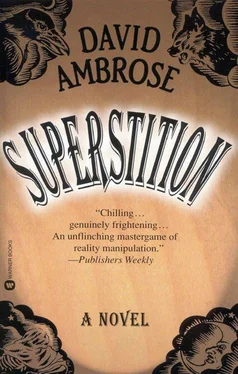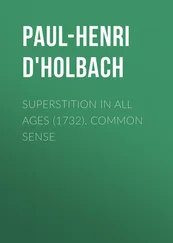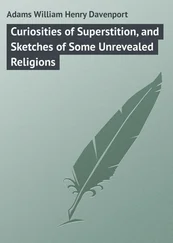David Ambrose - Superstition
Здесь есть возможность читать онлайн «David Ambrose - Superstition» весь текст электронной книги совершенно бесплатно (целиком полную версию без сокращений). В некоторых случаях можно слушать аудио, скачать через торрент в формате fb2 и присутствует краткое содержание. Жанр: Ужасы и Мистика, на английском языке. Описание произведения, (предисловие) а так же отзывы посетителей доступны на портале библиотеки ЛибКат.
- Название:Superstition
- Автор:
- Жанр:
- Год:неизвестен
- ISBN:нет данных
- Рейтинг книги:5 / 5. Голосов: 1
-
Избранное:Добавить в избранное
- Отзывы:
-
Ваша оценка:
- 100
- 1
- 2
- 3
- 4
- 5
Superstition: краткое содержание, описание и аннотация
Предлагаем к чтению аннотацию, описание, краткое содержание или предисловие (зависит от того, что написал сам автор книги «Superstition»). Если вы не нашли необходимую информацию о книге — напишите в комментариях, мы постараемся отыскать её.
Superstition — читать онлайн бесплатно полную книгу (весь текст) целиком
Ниже представлен текст книги, разбитый по страницам. Система сохранения места последней прочитанной страницы, позволяет с удобством читать онлайн бесплатно книгу «Superstition», без необходимости каждый раз заново искать на чём Вы остановились. Поставьте закладку, и сможете в любой момент перейти на страницу, на которой закончили чтение.
Интервал:
Закладка:
“The pins are set in a quincunx arrangement-like theater seats, where you're always looking between two heads in front of you instead of sitting directly behind somebody. You can see that, as the balls drop, each hits one pin in every row, bounces one way or the other, and hits another pin in the next. The further they drop, the more they tend to cascade out to one side or the other. But most of them, as you would expect, tend to stay more or less in the middle, with only a few bouncing all the way out to one side or the other. So you wind up with the balls distributed through these collection bins at the bottom in the form of a Gaussian curve…”
“Er…?”
“Bell curved-tapering equally on both sides towards a central summit. That's the normal pattern of random distribution. The point of the experiment is to try to influence the balls to fall more towards the right or more towards the left, so that you wind up with the summit of the pile off center, more towards one side or the other.”
“And you do this just by thinking?”
“Sure. You sit here,” he indicated a sofa about eight feet from the display, “watching the balls drop through the system, and willing them to go in one direction or the other.”
“And it works?”
He smiled at the incredulity in her voice.
“Over several runs, the deviations from pure chance are millions to one against. So to that extent, we have to say it works.”
“But how?”
“We don't know-yet. Come on, I'll show you some more.”
They continued their tour of the lab, which was housed in a collection of semibasement rooms abandoned by the engineering faculty when they moved to better premises. Joanna was shown a kind of clockface with lights in place of numbers. The lights flashed on and off in a random pattern, and the point of the experiment was to try to “will” them into moving consistently clockwise or counterclockwise.
There were computers that produced random numbers that “subjects” were supposed to “will” upward or downward. There was a randomly controlled water fountain where the subject would attempt to vary the height of the jet; a pendulum where the swing responded to conscious though nonphysical intervention; and other ingenious devices on the same theme, including a television monitor on which two images interacted while a viewer concentrated on one of them until it dominated the whole screen to the exclusion of the other.
“Of course,” Sam told her, “you don't get results in just one session. That's why volunteers have to work over a period of weeks or months. It's the aggregate of small but persistent deviations from the norm that becomes significant-increasingly so the longer you continue.”
He introduced her to the four full-time members of his team who were present that morning. The youngest, his assistant, Pete Daniels; the oldest, Peggy O'Donovan, an experimental psychologist, who was the lab manager. She had thick gray hair pulled back from her face in a bun and wore a caftan of rich colors over an ample figure. Joanna was captivated by her smile and the aura of calmness that she exuded-something that must, Joanna felt, be invaluable in any crisis. The other two were Bryan Meade, an electrical engineer who designed and maintained the experimental equipment; and Jeff Dorrell, a theoretical physicist who designed and implemented the department's data processing.
Missing were the final two members of Sam's team; Tania Phillips and Brad Bucklehurst, a psychologist and physicist respectively, were out in the field running remote perception studies with a group of volunteers.
“One volunteer, the ‘agent,’ is stationed in some randomly selected location at a given time,” Sam explained. “Another volunteer, the ‘subject,’ is located somewhere far from that location and with no knowledge of it. The point is for the subject to guess what the agent is seeing.”
“And you're going to tell me they can, aren't you?”
Sam grinned. “Sometimes with amazing accuracy. And believe me, we've done this thousands of times. The weirdest part is that sometimes we have the subject guess what the agent is seeing even before the agent goes to the location-sometimes days before. And we still get results.”
Joanna felt a surge of irritation with the sheer improbability of what she was hearing. “But how…?”
He held up his hands before she could even get the question out. “I don't know. All I can tell you is it works. Though what ‘it’ is…” He gestured as though it was anybody's guess. “We call it ‘psi.’”
6
Over the next few days Joanna spent as much time at the lab as she felt she could without getting under everybody's feet and becoming a nuisance. They were a good-natured group and gave her all the help they could. Sam didn't hide the fact that funding was a problem for the kind of work they were doing. That was obvious to Joanna from the shabbiness of the premises. A little favorable publicity, Sam mentioned casually one day, would be a great help in going after fresh grants.
She tipped her head to one side and regarded him with amusement. “What makes you so sure it's going to be favorable?” she asked.
He was genuinely nonplussed for a second. It simply hadn't occurred to him that anyone could be other than impressed by his work. “I'm sorry,” he said hastily, “you're perfectly right. I shouldn't have made that assumption.”
Joanna felt suddenly sorry for teasing him. He was, she had decided, a very sweet man with no guile and an almost boyish enthusiasm for what he was doing. That slight naivete combined with obvious intelligence and a rare breadth of learning made him undeniably attractive-something she was coming to realize with every hour spent in his company.
“It's okay,” she said, “I'm kidding. I'm fascinated by everything you've shown me. All we have to worry about is whether my editor will print it.”
A look of concern crossed his face. “You mean it isn't certain?”
She shook her head. “I need to find some hook for the story-something that'll make people sit up and say ‘I have to read this.’”
“But the implications of it all are fantastic. Machines controlled by thought processes. A direct interface between mind and computer. Some practical and usable degree of human telepathy…”
“I know-but it's all abstract and in the future. I need to show my editor something more than interesting theories and promising statistics. And I don't have it.”
They walked up the steps and across the concrete campus, heading for the street. Somewhere, incongruously, a piano was playing a Chopin waltz. Joanna assumed it was a recording or the radio, until the music faltered and the player repeated the phrase. Then they passed through a narrow passage and were hit by the noise of the city.
By the time they had settled at their now regular table at Mario's-paid for, Joanna insisted, by the magazine-the frown on Sam's face had lifted and she could see that he was bubbling with some new idea.
“There's something I've wanted to try for years,” he said after they'd ordered. “It's been done before, more than once, so I know it works. But if this isn't a ‘must read’ story, I don't know what is.”
“Tell me.”
“A group experiment, with you as one of the group. We're going to create a ghost.”
He watched her face for a response as he spoke. She returned his gaze, wondering how seriously to take him.
“Just so I know what I'm getting into,” she said with a note of caution in her voice, “would we be planning to create this ghost by, well, killing somebody? Or did you have another method in mind?”
“Nobody is going to be murdered,” he assured her with a laugh. “This will be a ghost of somebody who has never existed. We're going to make him up-or her.”
Читать дальшеИнтервал:
Закладка:
Похожие книги на «Superstition»
Представляем Вашему вниманию похожие книги на «Superstition» списком для выбора. Мы отобрали схожую по названию и смыслу литературу в надежде предоставить читателям больше вариантов отыскать новые, интересные, ещё непрочитанные произведения.
Обсуждение, отзывы о книге «Superstition» и просто собственные мнения читателей. Оставьте ваши комментарии, напишите, что Вы думаете о произведении, его смысле или главных героях. Укажите что конкретно понравилось, а что нет, и почему Вы так считаете.








